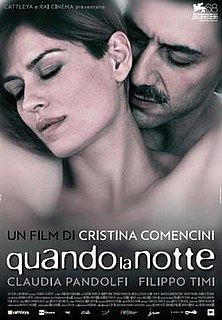
The Lords of the Night (Italian : Signori della Notte) were magistrates in the Republic of Venice that operated in special courts.

The Lords of the Night (Italian : Signori della Notte) were magistrates in the Republic of Venice that operated in special courts.

The criminal Lords of the Night are mentioned as early as the 12th century, first as two, and later as six nobles, with one for each district ( sestiere ) of Venice since 1260. Their name is derived from the initial responsibility of monitoring what was happening throughout the city during the night. Their areas of prosecuting included theft, murder, bigamy, carnal crimes of slaves, firearms, assaults, criminal conspiracy, homelessness, rape, desertion from galleys and non-payment of rents. They gathered in a dining room of the Doge's Palace in the Chamber of Torment, with interrogations and trials taking place usually at night or dusk. This enabled them, among other things, to apply the rope torture, and for the judges to present themselves to the defendant turning their shoulders to a wide window that partially concealed their appearance. Defendants could appeal their ruling by the Criminal Council of Forty through the Avogadori de Comùn .
By the end of 1544, the Civil Lords of the Night (Signori della Notte al Civìl) were created with part of their duties transferred from the criminal system, including enforcement of foreign sentences, sales of pledges, exile of criminals and the unwanted. They acted as a substitution for courts that did not operate on public holidays.
Nolo contendere is a legal term that comes from the Latin phrase for "I do not wish to contend". It is also referred to as a plea of no contest.
Criminal procedure is the adjudication process of the criminal law. While criminal procedure differs dramatically by jurisdiction, the process generally begins with a formal criminal charge with the person on trial either being free on bail or incarcerated, and results in the conviction or acquittal of the defendant. Criminal procedure can be either in form of inquisitorial or adversarial criminal procedure.

The Court of Appeal is the highest court within the Senior Courts of England and Wales, and second in the legal system of England and Wales only to the Supreme Court of the United Kingdom. The Court of Appeal was created in 1875, and today comprises 39 Lord Justices of Appeal and Lady Justices of Appeal.
Trial in absentia is a criminal proceeding in a court of law in which the person who is subject to it is not physically present at those proceedings. In absentia is Latin for "in (the) absence". Its meaning varies by jurisdiction and legal system.

The Piazza Fontana bombing was a terrorist attack that occurred on 12 December 1969 when a bomb exploded at the headquarters of Banca Nazionale dell'Agricoltura in Piazza Fontana in Milan, Italy, killing 17 people and wounding 88. The same afternoon, three more bombs were detonated in Rome and Milan, and another was found unexploded. The attack was carried out by the far-right, neo-fascist paramilitary terrorist group Ordine Nuovo and, possibly, certain undetermined collaborators.

The Bologna massacre was a terrorist bombing of the Bologna Centrale railway station in Bologna, Italy, on the morning of 2 August 1980, which killed 85 people and wounded over 200. Several members of the neo-fascist terrorist organization Nuclei Armati Rivoluzionari were sentenced for the bombing, although the group denied involvement.

The Supreme Court of Cassation is the highest court of appeal or court of last resort in Italy. It has its seat in the Palace of Justice, Rome.
In criminal law, strict liability is liability for which mens rea does not have to be proven in relation to one or more elements comprising the actus reus although intention, recklessness or knowledge may be required in relation to other elements of the offense. The liability is said to be strict because defendants could be convicted even though they were genuinely ignorant of one or more factors that made their acts or omissions criminal. The defendants may therefore not be culpable in any real way, i.e. there is not even criminal negligence, the least blameworthy level of mens rea.

The Piazza della Loggia bombing was a bombing that took place on the morning of 28 May 1974, in Brescia, Italy during an anti-fascist protest. The terrorist attack killed eight people and wounded 102. The bomb was placed inside a rubbish bin at the east end of the square. In 2015, a Court of appeal in Milan issued a final life sentence to Ordine Nuovo members Carlo Maria Maggi and Maurizio Tramonte for ordering the bombing, closing one of the longest-running cases on terrorism during Italy's years of lead.

Cristina Comencini is an Italian film director, screenwriter and novelist.

Buongiorno, notte is an Italian film released in 2003 and directed by Marco Bellocchio. The title of the feature film, Good Morning, Night, is taken from a poem by Emily Dickinson.

The Italian Code of Criminal Procedure contains the rules governing criminal procedure in every court in Italy. The Italian legal order adopted four codes since the Italian Unification. After the first two codes, in 1865 and 1913, the Fascist Government established in 1930 a new code adopting an inquisitorial system. In 1988 the Italian Republic adopted a new code, that could be considered to be somewhere in between the inquisitorial system and the adversarial system.

The judiciary of Italy is a system of courts that interpret and apply the law in the Italian Republic. In Italy, judges are public officials and, since they exercise one of the sovereign powers of the State, only Italian citizens are eligible for judgeship. In order to become a judge, applicants must obtain a degree of higher education as well as pass written and oral examinations. However, most training and experience is gained through the judicial organization itself. The potential candidates then work their way up from the bottom through promotions.
Monfalcone railway station serves the town and comune of Monfalcone, in the autonomous region of Friuli-Venezia Giulia, northeastern Italy.

Lecce railway station serves the city and comune of Lecce, in the region of Apulia, Southern Italy. Opened in 1866, it is the southern terminus of the Adriatic Railway (Ancona–Lecce), and is also the terminus of two regional lines, the Martina Franca–Lecce railway and the Lecce–Otranto railway.
The Council of Forty, also known as the Quarantia, was one of the highest constitutional bodies of the Republic of Venice, with both legal and political functions as the supreme court.

When the Night is a 2011 Italian drama film directed by Cristina Comencini, and based upon Comencini's novel of the same title.

Boncompagni Ludovisi Decorative Arts Museum, Rome, is the Decorative Arts Museum of the National Gallery of Modern Art of Rome. The Museum is located at Via Boncompagni, 18, near the elegant and historical Via Veneto.

Casarsa is a railway station serving the town of Casarsa della Delizia, in the region of Friuli-Venezia Giulia, northern Italy. The station opened in 1855 and is located on the Venice–Udine railway and Casarsa–Portogruaro railway. The train services are operated by Trenitalia.
The Faliero Coup was a failed 1355 coup designed to overthrow Venice's established republican government. Strains between the Venetian commoners and the nobility, originally stemming from the catastrophic failure of the nobility in the Battle of Porto-Longo against Venice's long-time rival, Genoa, are largely considered to be the main cause for the coup. However, traditional stories also point to the marriage of Doge Marino Faliero as a possible cause for the coup. Faliero, an 81 year old man, had recently taken a young bride, who was rumored to be engaged in multiple affairs, including with Michele Steno, a Venetian statesman and future Doge. The consistent rumors and apparent intense arrogance of the established Venetian elite seems to have gotten to Faliero in this explanation for a coup. A more reasonable one, however, is that Faliero wished to transform Venice into a dictatorship, mirroring those of Genoa and other northern Italian city-states. This view is, however, disputed by some historians, who cite Faliero's apparent regret at his trial, and, his lack of mentioning his belief that a dictatorship would better suit Venice's interests, a valid argument. These two actions are much more consistent with a man regretting a passionate crime, than one who had executed a calculated plan, some argue. The coup was poorly organized and abortive.